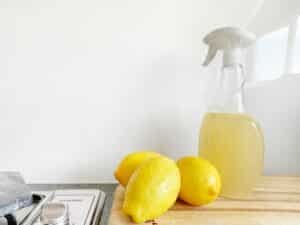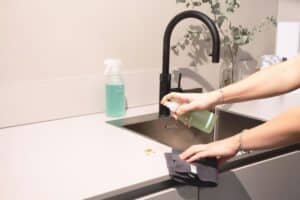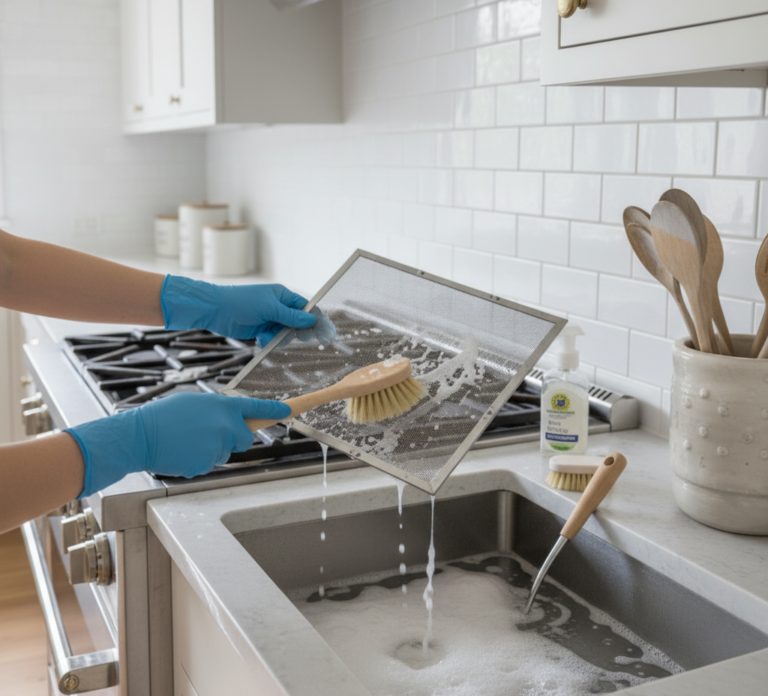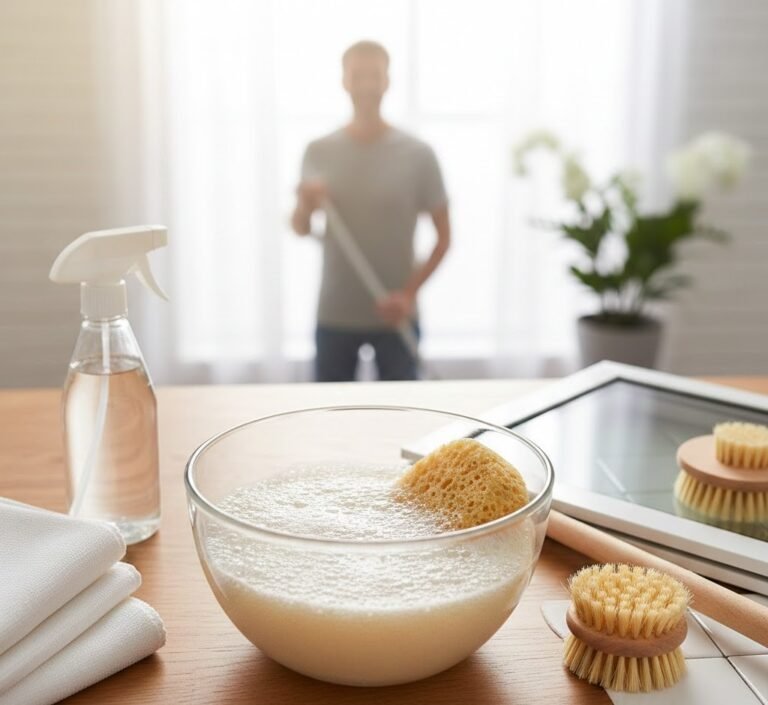Lemons: they’re not just for lemonade anymore! Use lemons with this citrus wonder is a powerhouse, offering a refreshing scent and natural acidity that can tackle grime in ways that might just surprise you. Whether you’re a tidy enthusiast or someone just looking to spruce up your space with eco-friendly options, lemons are your go-to. Here’s how to use lemon in 5 surprising ways to get your home sparkling clean:
1. Freshen Up the Garbage Disposal
Here’s a deeper dive into how to use lemons to freshen up your garbage disposal. The process is as simple as it is effective. Start by taking a lemon—any size will do, though a larger lemon means more citrusy goodness to combat odors and grime. Cut the lemon into small, manageable pieces. This increases the surface area that will come in contact with the disposal’s blades and interior surfaces, ensuring a thorough clean.
Once your lemon is prepped, toss the pieces into the disposal. Go ahead and run the disposal, adding a moderate stream of water to facilitate the process. The water helps to move the lemon pieces around, ensuring they touch all parts of the disposal. As the disposal works its magic, the lemon is pulverized, releasing its natural acids and oils. These natural cleaners do double duty: the acid helps to break down any lingering food particles or grease, while the oils release a clean, refreshing scent that neutralizes bad odors.

2. Revitalize Cutting Boards
Over time, cutting boards, whether they’re made of wood, plastic, or bamboo, can become a breeding ground for bacteria and a canvas for stains from various foods. This is where the humble lemon steps in, offering a natural and effective solution for cleaning and deodorizing these essential kitchen tools.
When you cut a lemon in half and rub it across the surface of your cutting board, you’re harnessing the power of citric acid. This natural disinfectant goes to work on the bacteria lurking in the nooks and crannies, especially those left behind after cutting raw meat or slicing brightly colored vegetables and fruits. The acid’s antibacterial properties are effective yet gentle, ensuring that your cutting board is sanitized without the need for harsh, potentially harmful chemicals.
But lemons don’t stop at just sanitizing. They’re also fantastic at tackling those stubborn stains that seem to permanently mark your board. The natural acidity of the lemon juice acts as a mild bleach, lightening stains without damaging the surface of your cutting board. It’s a simple yet effective way to keep your boards looking newer for longer.
For those particularly tough stains or grooves that have seen better days, introducing coarse salt into the mix can elevate the cleaning power of the lemon. By sprinkling a generous amount of salt over the board before you start rubbing with the lemon half, you create a natural abrasive cleaner. This combination works wonders on the deeper stains and can help smooth out rough patches, leaving your cutting board not only cleaner but also smoother to the touch.
This method of cleaning and revitalizing your cutting boards with lemon and salt is not just effective; it’s also eco-friendly and safe. You’re avoiding the use of synthetic chemicals, reducing the risk of contaminating your food with substances you’d rather not ingest. Plus, it leaves behind a fresh, citrus scent that makes your kitchen smell clean and inviting.
3. Shine Your Faucets
The problem of water spots and lime buildup is all too common, resulting from hard water that leaves behind minerals on your fixtures. These deposits can be stubborn, making your faucets look dull and neglected, even in the cleanest of homes. However, the solution is as close as your fruit basket.
Lemons, with their high citric acid content, are natural warriors against the grime that accumulates on faucets. When you cut a lemon in half and rub it directly onto the metal, the acid immediately begins to interact with the buildup, breaking it down and making it easier to wipe away. This method is gentle on your fixtures, avoiding the abrasiveness or chemical reaction that some cleaners might cause.
But the benefits of using lemon don’t stop at just cleaning. The natural oils found in the lemon peel play a crucial role in polishing the metal surfaces. These oils coat the faucet, providing a protective barrier that not only brings out the shine but also repels water to a degree, helping to prevent future spots and buildup. It’s a dual-action approach that cleans and polishes in one go.
After you’ve given your faucets a good rub-down with the lemon, the next steps are simple. Rinse the area with water to wash away any lemon residue and dissolved grime. Then, take a soft cloth and dry the faucets thoroughly. This step is vital as it removes any lingering water that could leave new spots, and it buffs the metal to a bright shine. The result is faucets that look as though they’ve just been installed, gleaming and free of any grimy buildup or water spots.

4. Natural Microwave Cleaner
Traditional cleaning methods can be cumbersome, involving scrubbing and the use of chemical cleaners that might not be desirable for an appliance used to heat your food. This is where the humble lemon, paired with a bit of water, offers a brilliantly simple and natural cleaning solution.
By combining the juice of one lemon with half a cup of water in a microwave-safe bowl, you create a natural cleaning agent that’s ready to tackle even the toughest microwave messes. The citric acid in the lemon works to break down the grime, while the boiling water helps the lemon’s essence to disperse evenly throughout the microwave as steam. This steam condensation is the key to loosening the particles and stains that have hardened onto the microwave’s interior surfaces.
When you microwave this mixture on high for three minutes, you’re not just creating steam; you’re essentially giving your microwave a lemon-scented sauna. This steam penetrates the grime and makes it easier to remove, reducing the need for aggressive scrubbing that could potentially damage the interior finish of your microwave. Moreover, the lemon-infused steam naturally deodorizes the appliance, eliminating any lingering smells from past meals. This is particularly beneficial for those who use their microwave frequently and find that odors from various foods tend to linger.
After the timer goes off, don’t be too quick to open the microwave door. Allowing the bowl to sit inside with the door closed for an additional five minutes maximizes the steam’s cleaning power, ensuring that the grime is thoroughly softened. Once this time has elapsed, you can open the door and proceed to wipe down the interior with a cloth. You’ll find that residues and stains that once seemed stubborn now easily come away, leaving your microwave looking clean and smelling refreshingly citrusy.
This method of cleaning your microwave with lemon and water is not only effective but also safe and eco-friendly. It avoids the use of harsh chemicals in an appliance that comes into direct contact with your food, providing peace of mind. Additionally, it’s a cost-effective solution, utilizing ingredients you likely already have in your kitchen.
5. Eco-Friendly Window Cleaner
The good news is that there’s a greener, more refreshing alternative that utilizes simple ingredients likely already in your pantry: water, white vinegar, and lemon juice. This trio combines to create an eco-friendly window cleaner that not only rivals the effectiveness of store-bought options but does so without leaving behind any harmful residues or odors.
Mixing one part water with one part white vinegar forms the base of this natural cleaning solution. Vinegar is renowned for its cleaning prowess, thanks to its acidity which cuts through dirt, grease, and grime without the need for scrubbing. It’s effective yet gentle on most surfaces, making it an ideal choice for glass. The addition of a tablespoon of lemon juice to this mixture elevates its cleaning power and infuses it with a pleasant, fresh scent. Lemon’s natural acidity boosts the solution’s ability to tackle tough stains and residues, while its citrus aroma neutralizes the vinegar’s sharp smell, leaving your windows and your home smelling clean and invigorated.
To use this homemade window cleaner, simply pour the mixture into a spray bottle for easy application. Spritz it generously onto your windows, covering the surface evenly. Then, take a clean cloth or a piece of newspaper to wipe the windows down. The beauty of this method lies in its simplicity and efficiency. The vinegar and lemon work together to dissolve dirt and lift away smudges, while the rubbing action helps to polish the glass, eliminating streaks. Newspapers, in particular, are effective for this task because their dense fibers do not leave behind lint or streaks like some cloths can.
One of the greatest advantages of this eco-friendly window cleaner is its versatility. It’s safe to use on a variety of glass surfaces, from windows to mirrors, and even glass-top tables, providing a streak-free shine that enhances the clarity and cleanliness of the surface. Additionally, this natural approach is kinder to the environment. By choosing to mix your own cleaner, you’re reducing the demand for plastic packaging and the release of potentially harmful chemicals into your home and the wider world.

Use Lemon in the Right Way
Embracing lemons as a staple in your cleaning arsenal is more than just a nod to eco-friendly practices; it’s a transformative approach to how we care for our homes. The versatility and natural potency of lemons offer a refreshing alternative to the chemical-laden cleaners that populate store shelves. By integrating lemons into your cleaning routine, you’re not only committing to a healthier environment inside your home but also contributing to a larger movement towards sustainability. This simple shift in habits underscores a powerful message: that effective cleaning doesn’t have to come at the expense of our planet or our well-being.
However, while the DIY approach with lemons offers a fantastic solution for day-to-day upkeep and spot cleaning, there are times when the scale or nature of the task calls for professional help. Whether it’s a deep clean that’s overdue, tackling tough stains and build-up that homemade solutions can’t handle, or simply managing a busy schedule that leaves little time for thorough cleaning, professional services come in handy. This is where Toronto Shine Cleaning shines. Their commitment to eco-friendly cleaning methods aligns with the values of using natural solutions like lemons.
So, as you leverage the natural cleaning power of lemons for daily touch-ups and spot cleaning, remember that for those bigger jobs, Toronto Shine Cleaning is ready to step in. Their expertise, combined with an eco-conscious approach, ensures that your home is not just clean, but also a safe, fresh, and vibrant space for you and your loved ones.



















